 Petzlover
Petzlover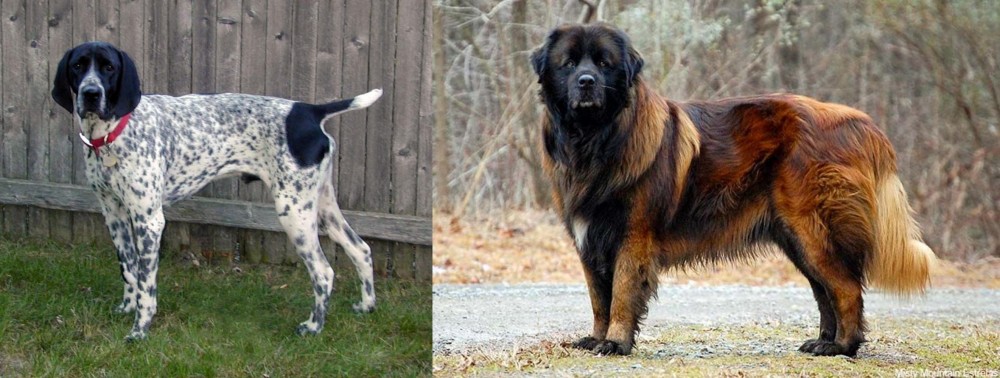 Braque d'Auvergne is originated from France but Estrela Mountain Dog is originated from Portugal. Braque d'Auvergne may grow 7 cm / 2 inches shorter than Estrela Mountain Dog. Braque d'Auvergne may weigh 12 kg / 27 pounds more than Estrela Mountain Dog. Braque d'Auvergne may live 3 years more than Estrela Mountain Dog. Both Braque d'Auvergne and Estrela Mountain Dog has almost same litter size. Braque d'Auvergne requires Low Maintenance. But Estrela Mountain Dog requires Moderate Maintenance
Braque d'Auvergne is originated from France but Estrela Mountain Dog is originated from Portugal. Braque d'Auvergne may grow 7 cm / 2 inches shorter than Estrela Mountain Dog. Braque d'Auvergne may weigh 12 kg / 27 pounds more than Estrela Mountain Dog. Braque d'Auvergne may live 3 years more than Estrela Mountain Dog. Both Braque d'Auvergne and Estrela Mountain Dog has almost same litter size. Braque d'Auvergne requires Low Maintenance. But Estrela Mountain Dog requires Moderate Maintenance
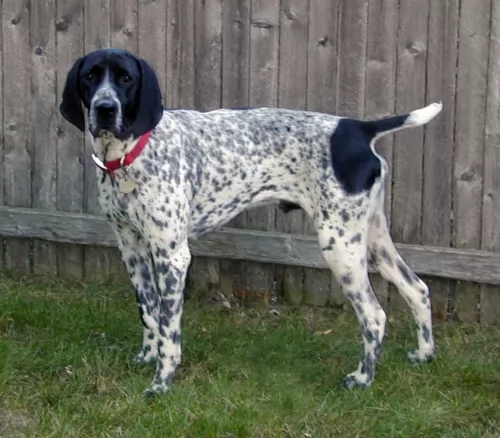 Sometime over 5 centuries ago, in the Cantal Region of France, was born a hunting breed, that might be the real ancestor of today’s pointing hunter dogs. Perhaps the oldest of all pointing gun dog is the Braque d’Auvergne. This breed comes from Central France in the region of Auvergne. This breed was developed prior to written dog breeding records in order to hunt in this region and find, point, flush out and retrieve fowl. This breed is clearly one of if not the oldest breeds in the French Braque. There is no agreement among historians on what breed is the oldest of the European pointing dogs and where they were developed – was it Spain or was it France? It is thought that the Braque Francais Gascogne is the original one of these in the early 1600’s while the Braque d’Auvergne came soon after. Due to the different hunting needs in the different parts of France, the Braque Francais Gascogne was crossed with a lot of other local scent hounds. The Braque d’Auvergne is one of the very oldest of all of these. There are records of the breeds existence in the 1700’s. It is probable that the Braque d’Auvergne was developed by crossing local dogs with Gascogne as well as with the Petit Bleu de Gascogne and the Grand Bleu de Gascogne.
Sometime over 5 centuries ago, in the Cantal Region of France, was born a hunting breed, that might be the real ancestor of today’s pointing hunter dogs. Perhaps the oldest of all pointing gun dog is the Braque d’Auvergne. This breed comes from Central France in the region of Auvergne. This breed was developed prior to written dog breeding records in order to hunt in this region and find, point, flush out and retrieve fowl. This breed is clearly one of if not the oldest breeds in the French Braque. There is no agreement among historians on what breed is the oldest of the European pointing dogs and where they were developed – was it Spain or was it France? It is thought that the Braque Francais Gascogne is the original one of these in the early 1600’s while the Braque d’Auvergne came soon after. Due to the different hunting needs in the different parts of France, the Braque Francais Gascogne was crossed with a lot of other local scent hounds. The Braque d’Auvergne is one of the very oldest of all of these. There are records of the breeds existence in the 1700’s. It is probable that the Braque d’Auvergne was developed by crossing local dogs with Gascogne as well as with the Petit Bleu de Gascogne and the Grand Bleu de Gascogne.
In all of Western Europe, the region of Auvergne is not very populated and has unique geography in that is hilly and has many extinct and eroded volcanoes. A lot of the region is still unpopulated. In this environment, wildlife has flourished, and hunting is successful in providing food for the regions people. This circumstance with an abundance of birds, led to the breeding of the Braque Auvergne to specialize in hunting in this area. The breed is not very popular outside of Auvergne and probably never was. That fact allowed them to be devastated by the Second World War. The Reunion des Amateurs de Braque d’Auvergne (RABA) was started to promote the pure breeding and the protection of the d’Auvergnes. But when Auvergnes was occupied during the war, the slowed breeding of the Braque d ‘ Auvergne almost eliminated the breed. There might have only been about 25 dogs left following the end of the war. These remaining dogs were used to revive the breed, but it is still uncommon, but not rare. Individuals have been imported by other countries including North America. The United Kennel Club (UKC) accepted the breed in 2006 but is not accepted by the AKC (American Kennel Club). The breed is still a working breed and outside of France, very rare.
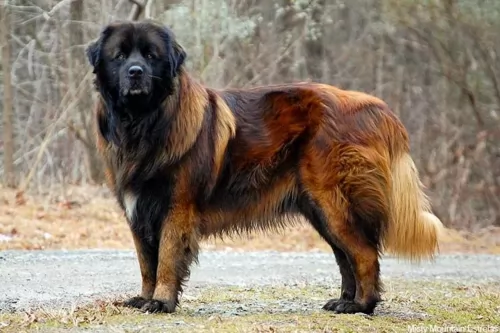 Also known as the Cao da Serra de Estrela, the large Estrela Mountain Dog from Portugal is an ancient breed, having been used for centuries to guard homesteads and livestock.
Also known as the Cao da Serra de Estrela, the large Estrela Mountain Dog from Portugal is an ancient breed, having been used for centuries to guard homesteads and livestock.
The Estrela, as a herding dog, has been developed over a long period of time because shepherds particularly wanted a dog that could survive in the mountains and be strong enough to guard livestock from predators.
The first official recorded breed standard was published in 1933, with an attempt to make the Estrela a distinct breed with a hooked tail and double dew claws.
Today the Estrela is a dog which can be found in other countries beyond Portugal, and in fact in 1973 pairs of the dogs were imported to the United States.
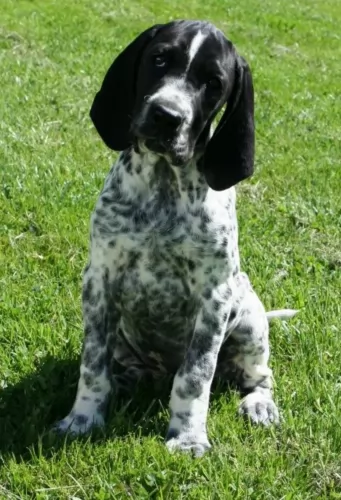 The Braque d’Auvergne is a well built, strong hunting dog with long ears, a large head and a docked tail. His coat is white with black markings and black ears and head. The breed looks a lot like all the other pointing dogs from France. They are medium in stature and has the appearance of a working gundog. He is athletic, muscular and fit. Docking the tail is outlawed in many countries and all of the United Kingdom. In that case the tail is high on the rump and always straight. Their face and head are big for the size of the body and shaped like an oval. With a long muzzle, deep set eyes and a gentle expression, they are kindly and handsome dogs. Their skin is loose but not droopy or wrinkled like hound dogs.
The Braque d’Auvergne is a well built, strong hunting dog with long ears, a large head and a docked tail. His coat is white with black markings and black ears and head. The breed looks a lot like all the other pointing dogs from France. They are medium in stature and has the appearance of a working gundog. He is athletic, muscular and fit. Docking the tail is outlawed in many countries and all of the United Kingdom. In that case the tail is high on the rump and always straight. Their face and head are big for the size of the body and shaped like an oval. With a long muzzle, deep set eyes and a gentle expression, they are kindly and handsome dogs. Their skin is loose but not droopy or wrinkled like hound dogs.
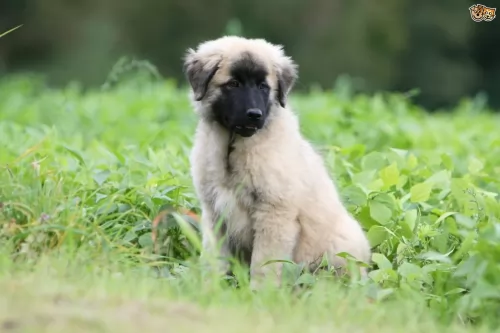 The large Estrela Mountain Dog stands between 62 and 72cm and weighs between 30kg and 50kg.
The large Estrela Mountain Dog stands between 62 and 72cm and weighs between 30kg and 50kg.
The dog has 2 coat types – short and long but always coarse and thick. The coat is available in a number of colors, from fawn to gray to yellow and brindle and there can be white and black mixed throughout the coat.
The head of the dog is large and long, the neck fairly short and thick, he has dark brown eyes, a bright, intelligent expression with small, floppy ears which are set high on the skull, falling backwards against the side of the head. The tail is long and thick and the dog has a deep chest.
A large, athletic dog, the Estrela Mountain Dog is actually a calm dog, while still being protective towards his human family.
He is an intelligent dog who responds well to training and socialization. He is an independent dog, so this training and socialization is important - will be good for him, turning him into an obedient, relaxed pet who gets on well with other pets in the home as well as with children.
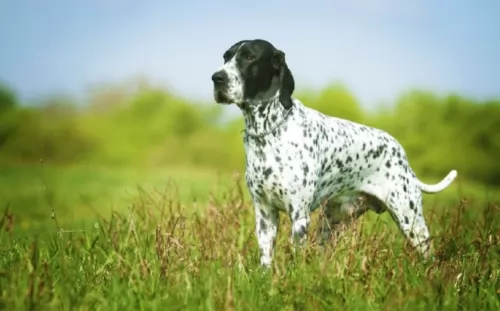 This is a gentle, adaptable and obedient breed. With their intelligence and affectionate nature, they make great family dogs and are eager to please their people. Living with other dogs is fine but not with small, prey size animals. The Braque d’Auvergne should never be left alone pets like gerbils and hamsters. They must be socialized to cats as pets and not prey before living with them successfully. They need to work closely with one human partner. They are first and foremost a hunting dog and need some sort of hunting simulation. They are devoted to their families and want to be constantly in their presence. This can lead to separation anxiety if they are left alone too much. They are great with children and need a family.
This is a gentle, adaptable and obedient breed. With their intelligence and affectionate nature, they make great family dogs and are eager to please their people. Living with other dogs is fine but not with small, prey size animals. The Braque d’Auvergne should never be left alone pets like gerbils and hamsters. They must be socialized to cats as pets and not prey before living with them successfully. They need to work closely with one human partner. They are first and foremost a hunting dog and need some sort of hunting simulation. They are devoted to their families and want to be constantly in their presence. This can lead to separation anxiety if they are left alone too much. They are great with children and need a family.
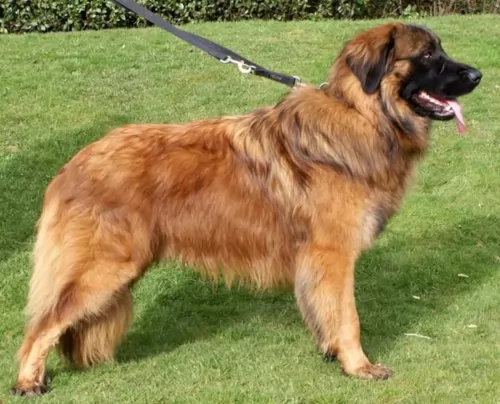 The Estrela Mountain Dog loves his human family and takes guarding them and protecting them seriously. He is a strong willed, independent dog that will require training and socialization. He makes an excellent pet, and is calm and gentle with children.
The Estrela Mountain Dog loves his human family and takes guarding them and protecting them seriously. He is a strong willed, independent dog that will require training and socialization. He makes an excellent pet, and is calm and gentle with children.
The Estrela Mountain Dog has so much going for him – he is beautiful to look at, he is loyal and protective with his human family, he is intelligent, loving and a healthy type of breed, and he is just waiting to become a member of your family.
 The Braque d’Auvergne is a healthy breed but can face some of the same health concerns as other pointers and hunting dogs. The long, droopy ears can get infected easily if wet and need to be cleaned regularly so that food or dirt are not trapped their either. Because of the small gene pool however they may be at risk for several issues. The breeders in France express concerns about possible hip dysplasia and testing is highly recommended. Because they are at risk for other conditions that might not show up until later in life, it is also recommended that they be tested by the Canine Eye Registration Foundation (CERF) as well as the Orthopedic Foundation for Animals (OFA).
The Braque d’Auvergne is a healthy breed but can face some of the same health concerns as other pointers and hunting dogs. The long, droopy ears can get infected easily if wet and need to be cleaned regularly so that food or dirt are not trapped their either. Because of the small gene pool however they may be at risk for several issues. The breeders in France express concerns about possible hip dysplasia and testing is highly recommended. Because they are at risk for other conditions that might not show up until later in life, it is also recommended that they be tested by the Canine Eye Registration Foundation (CERF) as well as the Orthopedic Foundation for Animals (OFA).
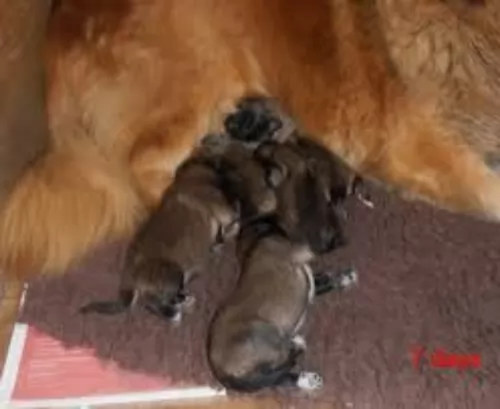 The Estrela Mountain Dog can live to be between 10 and 14 years of age, but as with any large dog, he will have a tendency to suffer from hip- and elbow dysplasia.
The Estrela Mountain Dog can live to be between 10 and 14 years of age, but as with any large dog, he will have a tendency to suffer from hip- and elbow dysplasia.
Dilated cardiomyopathy is another common heart failure disease found particularly in large-breed dogs. The Estrela is prone to this disease and you’ll notice he has shortness of breath, abdominal swelling and coughing. The disease may not be curable, but there are certainly treatments for it.
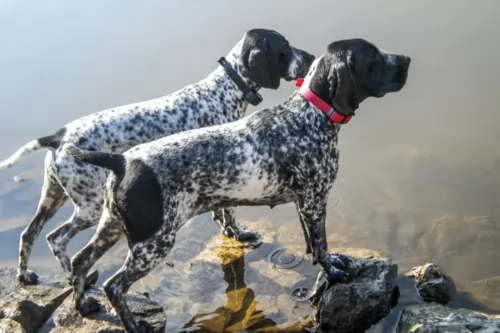 The Braque d’Auvergne needs a high-quality diet fit for a working dog but not too much to make him obese. They are an active breed to choose a formula that is designed for working dogs.
The Braque d’Auvergne needs a high-quality diet fit for a working dog but not too much to make him obese. They are an active breed to choose a formula that is designed for working dogs.
Although no studies have been conducted on the Braque d’Auvergne’s health issues there are many conditions that similar breeds are susceptible to and the d’Auvergne might be as well. This includes any of the following:
This is an active, working dog who needs a lot of stimulation and exercise. The only real appropriate exercise for these dogs is hunting or outings in the woods. He not only needs the exercise, but he also needs to stimulate his sense of smell and his gundog intelligence. He might excel in lure chase or even a form or barn hunt. They certainly could excel at obedience trials and perhaps rally. If you are a weekend hunter then this is the ideal dog for you. They are so easy to train that they surpass other pointers for success with casual hunters. They hunt at a slower pace than many other gundogs. Their intelligence and athleticism lend itself well to agility and flyball also. They need a large (+acres)fenced in area to run and play.
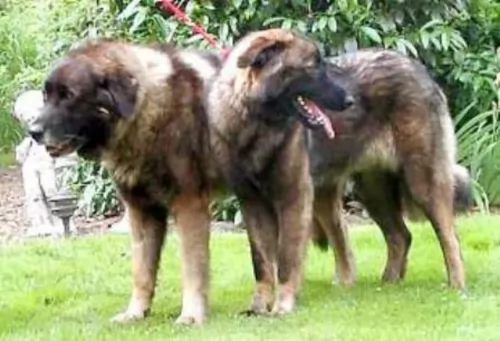 The Estrela Mountain Dog is a large dog and thankfully, when it comes to feeding him, experts in dog feeding have come up with commercially manufactured dog feeds that particularly cater for a dog’s age, his size and any illnesses he may have.
The Estrela Mountain Dog is a large dog and thankfully, when it comes to feeding him, experts in dog feeding have come up with commercially manufactured dog feeds that particularly cater for a dog’s age, his size and any illnesses he may have.
As a large dog, your Estrela Mountain Dog can suffer with joint problems such as hip dysplasia. For hip dysplasia you want to be looking at a dog food for large dogs which contains joint-health ingredients. An ingredient in the dog food such as glucosamine can work to reduce the damage brought about by hip dysplasia.
Mix in some cooked brown rice, vegetables and chicken into his kibble from time to time. You want your pet to live a long, healthy life and raw meat added in occasionally can increase your pets energy levels, reduce the risk of joint disease and ensure a shiny, soft coat. Raw meat can provide iron, zinc, vitamins, minerals and potassium.
The Estrela isn’t a huge shedder, but his beautiful, thick coat will require brushing twice a week. It’s your chance to check him over for fleas and ticks as well, and the entire grooming process – checking his ears, nails and teeth – is an excellent bonding experience for you and your canine friend.
The Estrela may be large, but he is fairly calm. He’ll love to join you on your daily walks or for a ball game in the garden. He can adapt to life in the city or the country, but his big size will mean he isn’t suited to a tiny property.